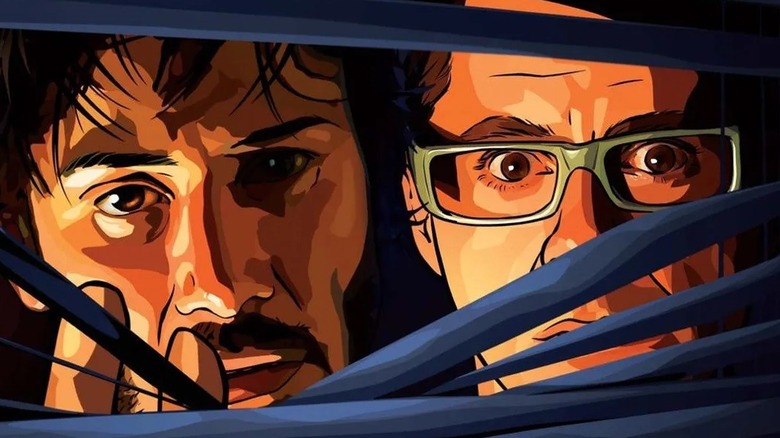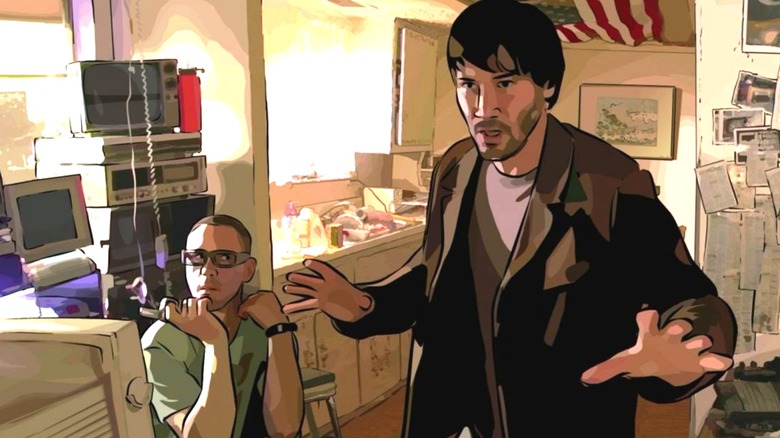Keanu Reeves And Robert Downey Jr.'s Underrated 2006 Sci-Fi Movie Deserves More Fans
When one thinks of sci-fi movies starring Keanu Reeves, "The Matrix" franchise is the first thing that comes to mind. A few people might even bring up the ahead-of-its-time box office bomb "Johnny Mnemonic." As for Robert Downey Jr.'s contributions to that genre, his time as Tony Stark/Iron Man in the Marvel Cinematic Universe would definitely dominate the discussion. But both actors have a somewhat forgotten sci-fi gem that they starred in together in 2006, one that was adapted from a story by one of the godfathers of the science fiction genre: Philip K. Dick.
"A Scanner Darkly" used the eye-catching technique known as rotoscoping – which the film's director and writer, Richard Linklater, had previously utilized for his talky philosophical drama "Waking Life" — to bring to Dick's 1977 novel of the same name to the screen for the first time. Essentially, Linklater filmed Reeves, Downey Jr., and the rest of the cast as if shooting a traditional live-action film, and then each individual frame was animated with computers to give the movie an intentionally uncanny blend of watercolor comic book visuals and lifelike human movement.
Reviews for "A Scanner Darkly" were positive but fairly lukewarm, and the movie lost money at the box office despite a pretty modest production budget. Those factors, coupled with the aforementioned MCU being just around the corner and preparing to dominate the cinematic landscape for years to come, doomed "A Scanner Darkly" to come and go with minimal pop culture impact. But it's an excellent film that is well worth discovering even all these years later, especially since it's one of Reeves' favorite movies he's ever made.
Richard Linklater wanted to take a different approach to adapting Philip K. Dick
In "A Scanner Darkly," Keanu Reeves plays Bob Arctor, an undercover narcotics officer who ends up becoming an addict himself. Robert Downey Jr. is James Barris, one of Robert's housemates who is secretly narcing on Robert in order to work his way into becoming a cop himself. There is also a drug dealer named Donna Hawthorne (Winona Ryder) who Robert is pretending to romance in order to get information about her business and connections — and her biggest customer is James, whom Robert has also been tasked with spying on. And all of that is just what is going on in one version of the reality presented in the film, not even getting into the hallucinations caused by the movie's main drug, which has not only the audience but also the characters themselves unsure of what's real and who's who.
Sitting comfortably in the top 10 in Looper's ranking of every Philip K. Dick adaptation, "A Scanner Darkly" stands out from the pack because Linklater wanted it to. The filmmaker opined that most attempts to turn a Dick story into a film took the same action thriller path, but he didn't think that this approach suited this particular story. Dick's daughters, who at the time had just recently taken a much more active role in approving which of their father's works had the estate's blessing for adaptation, were initially reluctant to allow Linklater to make "A Scanner Darkly" because it was one of Dick's most personal stories. That alone already made it a tough sell, but the fact that it was going to be animated had them even more skeptical. But Linklater ultimately sold them on his vision, in large part because he wasn't going to gloss over the story's depiction of drugs and substance abuse.

